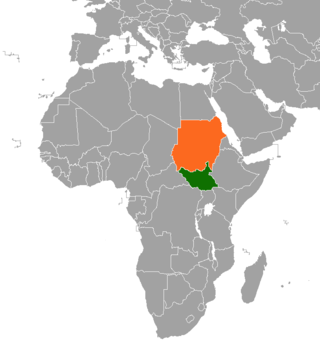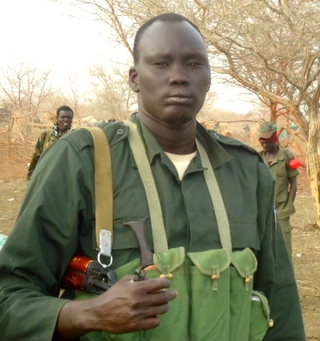Related Research Articles

Jonglei State is a state of South Sudan with Bor as its centre of government and the biggest city. Jonglei state comprises nine counties: Bor, Akobo, Ayod, Uror, Duk, Nyirol, Pigi, Twic East, and Fangak. Jonglei State is the largest state by area before reorganisation, with an area of approximately 122,581 km2, as well as the most populous according to the 2008 census conducted in present-day South Sudan's second period of autonomy. The boundaries of the state were again changed as a result of a peace agreement signed on 22 February 2020.

The Nuer people are a Nilotic ethnic group concentrated in the Greater Upper Nile region of South Sudan. They also live in the Ethiopian region of Gambella. The Nuer speak the Nuer language, which belongs to the Nilotic language family. They are the second largest ethnic group in South Sudan. The Nuer people are pastoralists who herd cattle for a living. Their cattle serve as companions and define their lifestyle. The Nuer call themselves "Naath".

Salva Kiir Mayardit, also known as Salva Kiir, is a South Sudanese politician who has been the President of South Sudan since its independence on 9 July 2011. Prior to independence, he was the President of the Government of Southern Sudan, as well as First Vice President of Sudan, from 2005 to 2011. He was named Commander-in-Chief of the Sudan People's Liberation Army (SPLA) in 2005, following the death of John Garang.

The Murle are a Surmic ethnic group inhabiting the Pibor County and Boma area in Greater Pibor Administrative area, South Sudan, as well as parts of southwestern Ethiopia. They have also been referred as Beir by the Dinka and as Jebe by the Luo and Nuer, among others. The Murle speak the Murle language, which is part of the Surmic language family. The language cluster includes some adjoining groups in Sudan, as well as some non-contiguous Surmic populations in southwestern Ethiopia.

Sudanese nomadic conflicts are non-state conflicts between rival nomadic tribes taking place in the territory of Sudan and, since 2011, South Sudan. Conflict between nomadic tribes in Sudan is common, with fights breaking out over scarce resources, including grazing land, cattle and drinking water. Some of the tribes involved in these clashes have been the Messiria, Maalia, Rizeigat and Bani Hussein Arabic tribes inhabiting Darfur and West Kordofan, and the Dinka, Nuer and Murle African ethnic groups inhabiting South Sudan. Conflicts have been fueled by other major wars taking place in the same regions, in particular the Second Sudanese Civil War, the War in Darfur and the Sudanese conflict in South Kordofan and Blue Nile.

South Sudan, officially the Republic of South Sudan, is a landlocked country in eastern Central Africa. It is bordered by Ethiopia, Sudan, the Central African Republic, the Democratic Republic of the Congo, Uganda, and Kenya. Its population was estimated at 11,088,796 in 2023. Juba is the capital and largest city.

South Sudan is home to around 60 indigenous ethnic groups and 80 linguistic partitions among a 2021 population of around 11 million. Historically, most ethnic groups were lacking in formal Western political institutions, with land held by the community and elders acting as problem solvers and adjudicators. Today, most ethnic groups still embrace a cattle culture in which livestock is the main measure of wealth and used for bride wealth.
The history of South Sudan comprises the history of the territory of present-day South Sudan and the peoples inhabiting the region.

Human rights in South Sudan are a contentious issue, owing at least in part to the country's violent history.
Ayod County {Formerly known as Yod locally } is an administrative area in Jonglei State, South Sudan, with headquarters in Ayod. Its inhabited by Gawaar Nuer categorically divided into two sections e.g Baar and Nyang then which are further consists of major clans of Chieng- Kapel, Bhaang,Jamuogh, Chieng -Thony, Chieng - Nyadakuon, Jithiep, Chieng-Pear, and Chieng-Nyaiguak. In the January 2011 referendum the results were unanimously in favor of independence from Sudan.
Ethnic violence in South Sudan has a long history among South Sudan's varied ethnic groups. South Sudan has 64 tribes with the largest being the Dinka, who constitute about 35% of the population and predominate in government. The second largest are the Nuers. Conflict is often aggravated among nomadic groups over the issue of cattle and grazing land and is part of the wider Sudanese nomadic conflicts.
The South Sudan Democratic Movement (SSDM), sometimes called the South Sudan Democratic Movement/Army (SSDM/A), was a South Sudanese militant group. Along with its armed wing, the South Sudan Defence Army (SSDA), rebelled against the government of South Sudan led by President Salva Kiir Mayardit and the Sudan People's Liberation Movement.

The Nuer White Army, sometimes decapitalised as the "white army", is a semi-official name for a militant organisation formed by the Nuer people of central and eastern Greater Upper Nile in modern-day South Sudan as early as 1991. According to the Small Arms Survey, it arose from the 1991 schism within the Sudan People's Liberation Movement/Army (SPLM/A) for the dual purpose of defending Nuer cattle herds from neighbouring groups and fighting in the Second Sudanese Civil War between the SPLM/A and the Sudanese government.
Pochalla is a county in Pibor Administrative Area, South Sudan. The capital of the state, where the governor and state parliament is located, is in Bor town, which is situated on the Nile River at the western end of the state. Pochalla is to the extreme east of the state, located on the border with Ethiopia. Much of the County is sandwiched between two rivers, the Akobo, which forms the national boundary to the east, and the Oboth to the west. The dominant people group are the Anyuak who border the Murle to the west and the Nuer to the North, both of whom are cattle keeping tribes, who have a culture of raiding to increase their cattle numbers. To the east in Ethiopia, the Anuak have had tensions with the government, so communications are weak.

David Yau Yau was a Governor of Boma State and the Chief Administrator of the Greater Pibor Administrative Area of South Sudan. He was previously the leader of a Murle insurrection against the South Sudanese government.

The South Sudanese Civil War was a multi-sided civil war in South Sudan between forces of the government and opposition forces. In December 2013, President Kiir accused his former deputy Riek Machar and 10 others of attempting a coup d'état. Machar denied trying to start a coup and fled to lead the SPLM – in opposition (SPLM-IO). Fighting broke out between the Sudan People's Liberation Movement (SPLM) and SPLM-IO, igniting the civil war. Ugandan troops were deployed to fight alongside the South Sudanese government. The United Nations has peacekeepers in the country as part of the United Nations Mission in South Sudan (UNMISS).
The Bor massacre was a massacre of an estimated 2,000 civilians in Bor on November 15, 1991 during the Second Sudanese Civil War. The massacre was carried out mostly by Nuer fighters from SPLA-Nasir, led by Riek Machar, and the militant group known as the Nuer White Army, shortly after Machar split off from the SPLA led by John Garang. Amnesty International said at least 2,000 Dinka were killed, though the real number may have been higher. In the years which followed, an estimated 25,000 more died from famine as their cattle were either stolen or shot and the fighting had displaced them from the land they had once cultivated. At the time, Riek Machar described the incident as "propaganda" and "myth". In 2012, he publicly apologized for his part in the massacre.

The Greater Pibor Administrative Area is an administrative area in South Sudan.

Boma State was a state in South Sudan that existed between 2 October 2015 and 22 February 2020. It was located in the Greater Upper Nile region and was formerly part of the state of Jonglei. The state bordered Akobo State, Imatong State, Jonglei State, Kapoeta State, Bieh State, Terekeka State and the country of Ethiopia to the east.
In January 2022, armed Murle militias attacked Bor Dinka villages in Jonglei State, South Sudan, killing dozens of people.
References
- ↑ Ferrie, Jared (27 December 2011). "United Nations Urges South Sudan to Help Avert Possible Attack". Bloomberg. Retrieved 27 December 2011.
- ↑ "Why hundreds of people are dying over cattle in East Africa". Los Angeles Times. Retrieved 23 November 2016.
- ↑ "Incidents of intercommunal violence in Jonglei state" (PDF). UNMISS. Retrieved 23 November 2016.
- ↑ "In South Sudan, massacre of 3000 is reported". New York Times. Retrieved 23 November 2016.